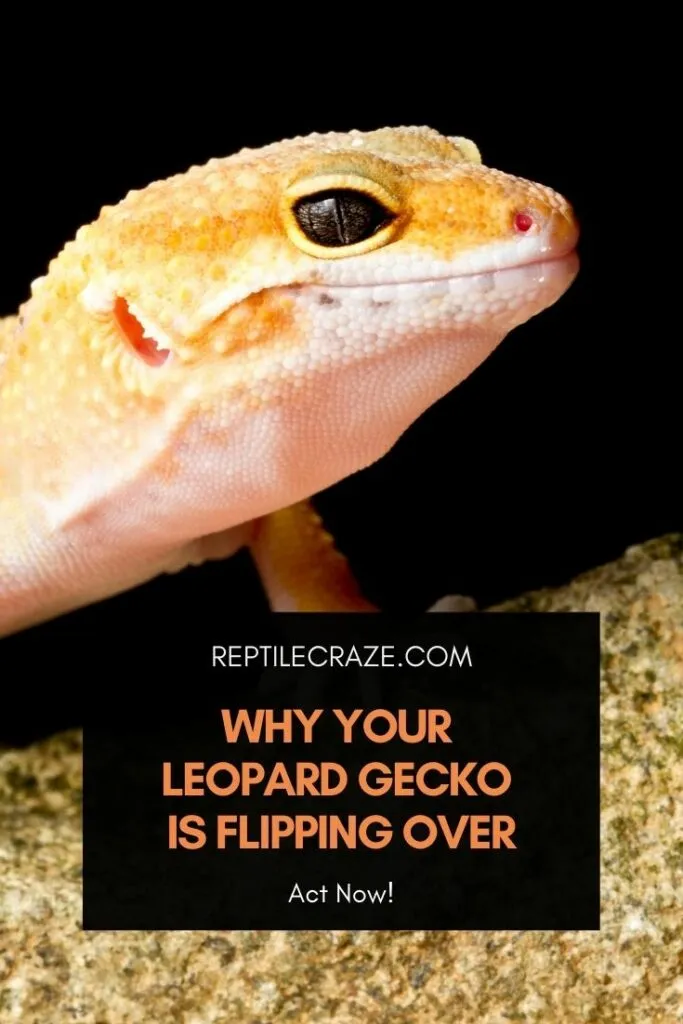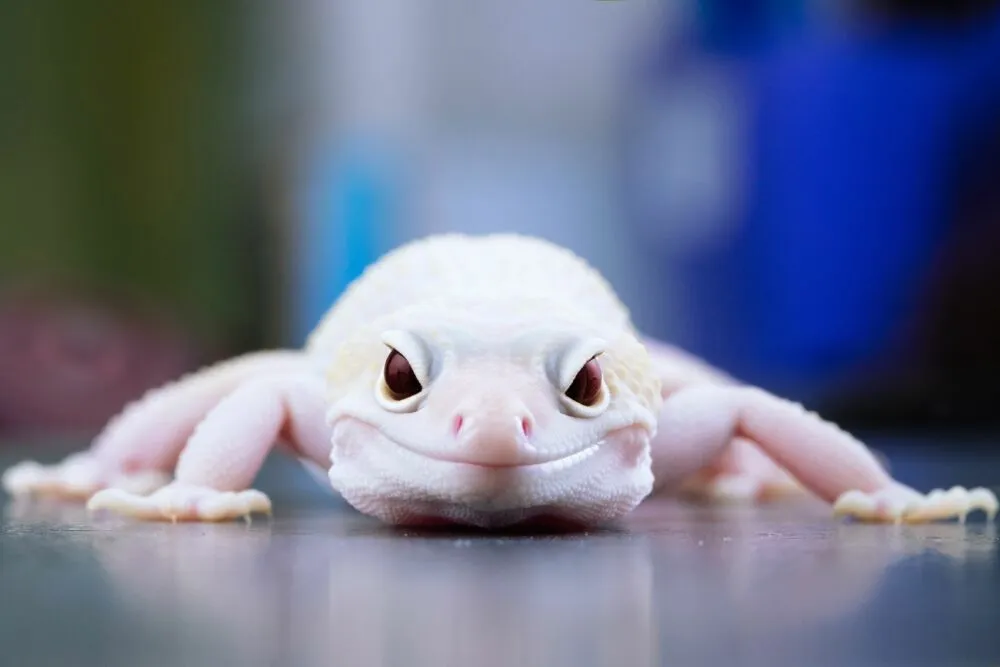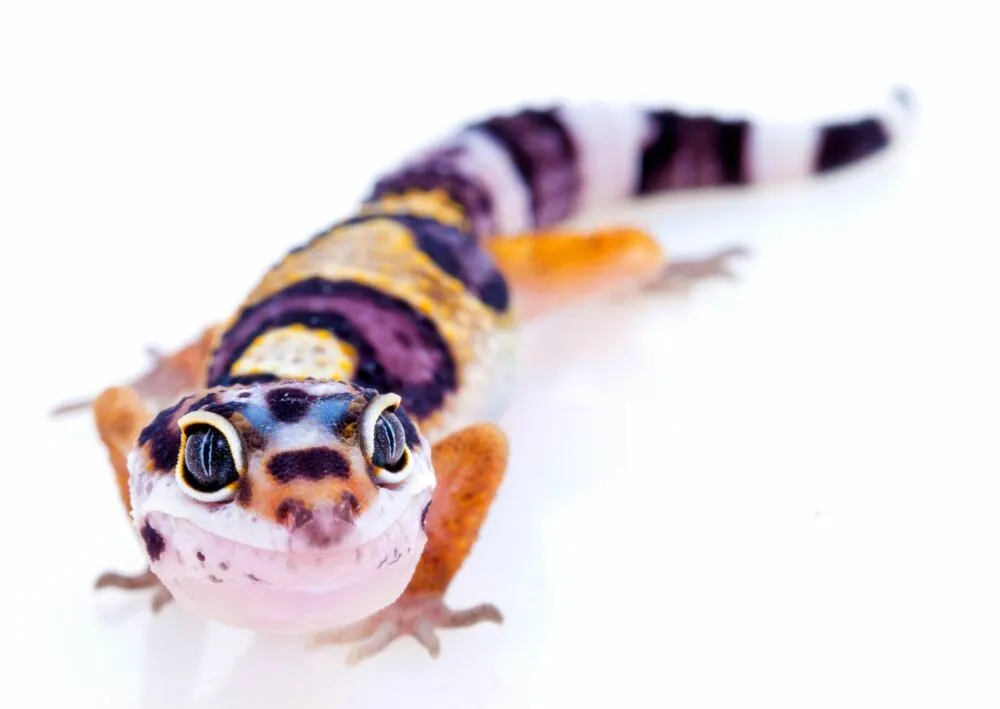
It’s wonderful to watch a leopard gecko moving around its habitat, but when it suddenly flips over onto its back, this spells trouble. A few years ago a friend of mine came to me to ask advice about this sort of behavior, and I told him that we had to act fast to save his pet.
A leopard gecko flips over onto its back when it has a condition called enigma syndrome. This is the result of an inherited faulty gene that significantly impairs a leopard gecko’s neurological function. Other symptoms of this condition include seizures, circling, and head tilting.
Although enigma syndrome is incurable, there are ways to manage the condition if you know how. Let’s take a look at what enigma syndrome is, how it manifests, and what you can do about it.
Table of Contents
What Causes Leopard Gecko Flipping?
When your leopard gecko flips over, it’s not cute, quirky behavior. It shows that your pet has a debilitating condition. Enigma syndrome is the primary reason for the leopard gecko death roll.
What is Enigma Syndrome in Leopard Geckos?
Enigma syndrome specifically targets your leopard gecko’s brain function. It is an inherited condition, passed on from one leopard gecko to another.
Although further research is still required to understand the illness, the condition seems to either attack or alter a leopard gecko’s sense of equilibrium. One theory is that it kills the brain cells responsible for keeping balance.
Essentially, leopard geckos suffering from enigma syndrome can no longer tell the difference between up and down.
It’s possible that the sense of orientation and balance is reversed, which would explain why, as the disease progresses, afflicted leopard geckos try to flip over onto their backs with increasing regularity.
Leopard geckos found carrying this gene should not be allowed to breed. This seems drastic, but it’s the best defence against the illness and ensures that future generations of leopard geckos are healthy.

What Causes Enigma Syndrome?
Believe it or not, enigma syndrome is a very recent development. It’s a bi-product of selective breeding among leopard gecko breeders.
It’s exactly the same type of problem that dog breeders face where some breeds develop significant genetic illnesses or predisposition to illnesses because genetically related or similar lines are constantly bred together.
This inbreeding causes genetic mutations. This happens even in humans! There is a story about the Habsburgs, an aristocratic European family who developed significant malformities because they wanted to ‘keep their bloodline pure’.
Oops, was heading into a history lesson, there! Back to leopard geckos.
Around the mid-2000s, leopard gecko owners and breeders began to notice the death roll behavior (among other symptoms we’ll discuss shortly). At first, this was a mystery. Why were certain leopard geckos flipping over?
As it turned out, the death roll behavior was largely due to a specific genetic flaw known as an autosomal disorder. This occurs when there are mutations in chromosomes not attached to the animal’s sex.
Here comes the science:
- Animals carry two copies of each gene. These pairs are called alleles.
- Alleles can be dominant, meaning they have a strong effect, or that are recessive, meaning they do not.
- When leopard geckos carry a dominant version of the enigma syndrome causing gene, they are likely to develop it.
If two parents carry this gene, they are much more likely to pass it onto their offspring.
The interplay between environment and genetics is important here. A leopard gecko carrying the enigma gene might only start to show illness when stressed, competing with another leopard gecko, or when the right tank setup for a leopard gecko isn’t present.
The Symptoms of Enigma Syndrome In Leopard Geckos
Symptoms of enigma syndrome vary widely. Some leopard geckos are worse affected than others. It’s important to remember that symptoms tend to occur only in adulthood. Death rolling or flipping is the most common sign, but other symptoms can appear alongside or in place of this.
Enigma syndrome symptoms include:
Head Tilting
Because enigma syndrome negatively affects balance, your leopard gecko might tilt its head at unusual angles. Be wary, however; this can also be because of an ear infection or malnutrition.
Star Gazing
This does not mean looking up at the sky! Star gazing means that your leopard gecko seems unresponsive to stimuli for a moment as if it’s caught in a daydream, before snapping back to reality.
Circling
This happens when your leopard gecko moves in a circle as if following its tale. It can do this repeatedly or occasionally.
Repetitive Motions
Like circling, your leopard gecko can repeat the same motion over and over again. This includes moving its tail or head up and down or side to side.
Poor Catching Ability
Leopard geckos are excellent at catching insects. Enigma syndrome interrupts a leopard gecko’s ability to do this by causing disorientation and eroding fine motor skills.
Seizures
Fits or seizures are common in leopard geckos with enigma syndrome. This can cause temporary seizing up and unresponsiveness. It can also cause a leopard gecko to go into a panic and move around as if trying to evade the danger.
Strange Hiding Habits:
Because enigma syndrome can affect your leopard gecko’s decision making, it may start to hide in unusual places or frequent parts of its environment it never bothered with previously.
Tremors
Separate from seizures, leopard geckos with enigma syndrome can lose control of their muscles and shake slightly as they try to stand up or move around.
Some or all of these symptoms can be caused by other conditions. Please consult a vet if you are concerned.

Which Leopard Geckos Have Enigma Syndrome?
It’s often said that enigma syndrome and death rolling only happens in one type of leopard gecko – the enigma morph. However, it can occur in any leopard gecko unfortunate enough to possess the necessary gene mutation.
A specific type of leopard gecko called the enigma morph is most likely to develop enigma syndrome.
The enigma morph is a type of leopard gecko that has beautiful, varied colorings and spots. This is why they have been popular among breeders. Anything with a unique look tends to be seen as more exotic.
The problem is that the more you selectively breed leopard geckos to have unique features the more likely they are to develop genetic flaws.
However, just because a leopard gecko is an enigma morph does not mean it will develop enigma syndrome, but it is more likely than with a non-enigma morph.
How to Treat Flipping Over In Leopard Geckos – Enigma Syndrome
Unfortunately, there is no known cure for enigma syndrome. In the most severe cases, the leopard gecko may have to be euthanized.
However, there are some things you can do to treat the condition and manage its symptoms in many cases. here are a few helpful tips.
- Enigma syndrome isn’t contagious, but it’s important not to breed an animal that has this condition. This will protect captive leopard gecko populations from nurturing the defective gene.
- Over stimulation can worsen enigma syndrome symptoms. Ensure your leopard gecko’s environment is as soothing as possible. If your
tank is kept in a room where there is a lot of activity or loud noises, consider moving it to a quieter spot. - Only handle your leopard gecko if it feels happy being touched. If not, leave your pet alone in his or her
tank . - Provide adequate hides for your leopard geckos. Three is a good number per animal. Leopard geckos with enigma syndrome feel stressed when in cramped or overcrowded conditions.
- If your leopard gecko is sharing a
tank with another of the same species, observe its behavior and body language. If its condition worsens and it seems stressed, place it in atank of its own. - Do not change the environment set up too often. This will stress your pet.
- You might need to assist your leopard gecko with eating and drinking if it has enigma syndrome. Make sure it has a well-balanced diet of crickets, mealworms, and wax worms (not too often, we explain why here). Dust any dried
food with a vitamin supplement.
Conclusion
Flipping over or death rolling in leopard geckos can be distressing both for the pet and owner. Hopefully, I’ve been able to help with a few tips.
Remember, just because your pet has enigma syndrome, doesn’t mean you can’t have many happy years with your pet. Good luck, and please do let us know your experiences with enigma syndrome in the comments section below.
- Enchi Ball Python: A Unique and Stunning Morph of Python regius - March 27, 2025
- Emerald Tree Monitor: The Enigmatic Green Guardian of the Rainforest - March 26, 2025
- The Egyptian Cobra (Naja haje): A Fascinating Serpent - March 25, 2025
